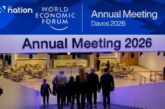By FGR Bureau
“From now on it is only through a conscious choice and through a deliberate policy that humanity can survive.”
Pope John Paul II
 The 24th meeting of the Conference of the Parties (CoP-24) to the UN Framework Convention on Climate Change (UNFCCC) was convened from 2-15 December 2018 at Katowice (Poland) bringing together over 22,000 participants, including nearly 14,000 government officials, over 7,000 representatives from UN bodies and agencies, intergovernmental organizations, and civil society organizations, and 1,500 members of the media.
The 24th meeting of the Conference of the Parties (CoP-24) to the UN Framework Convention on Climate Change (UNFCCC) was convened from 2-15 December 2018 at Katowice (Poland) bringing together over 22,000 participants, including nearly 14,000 government officials, over 7,000 representatives from UN bodies and agencies, intergovernmental organizations, and civil society organizations, and 1,500 members of the media.
COP24 President Michal Kurtyka and Executive Secretary of the UN Framework Convention on Climate Change Patricia Espinosa pose with the heads of delegations after adopting the final agreement during a closing session of the COP24 UN Climate Change Conference 2018, Katowice, Poland, December 15, 2018 (Photo Courtesy: REUTERS)
Convening of the CoP-24 took place at such a pivotal moment when the world is faced with the increasingly devastating impacts of climate change. The participating countries to the CoP-24 were called upon to overcome long-standing disagreements and hammer out the technical details of a robust and ambitious post-2020 climate regime in the wake of the fact of the deadline of finalizing the Paris Agreement “rulebook” looming. In the midst of vast array of changes having taken place since the conclusion of the Paris Agreement three years ago that inter alia included warnings of science on extreme weather events worldwide, mounting level of global emissions, political context shifting from multilateralism to populism and in some cases, even opposition to scientific evidence, it had started becoming evident that the transition to a zero-emissions economy is not yet fully underway. Many experts are of the opinion that despite heavy odds like political headwinds, long-standing disagreements among countries, and the technical complexity of the task, the CoP-24 seemed delivering desired results.
The CoP-24 at Katowice accomplished its task of delivering a ‘Rulebook’ for the Paris Agreement, and amid calls for greater ambition to address the climate crisis, the conference largely delivered, by producing a package that facilitate countries’ efforts to implement the Paris Agreement. While focusing on completing work on the Paris Agreement Work Programme (PAWP), this meeting also adopted the Katowice Climate Package, which enclosed decisions on nearly all of the issues mandated as part of the PAWP, including:Undoubtedly, the ‘Katowice Climate Package’ adopted on 15 December 2018, has put in place a set of implementation guidelines that were considered by many to be sufficiently robust; nevertheless, some question still bother many experts: Does the Katowice Package establish the strong and stable institutional framework required to implement the Paris Agreement? And, given the signals of increasing urgency, what does this framework mean for ambition in the post-2020 era? Answers to these and other related queries can be ascertained by examining the Paris Rulebook in some detail by focusing on key parameters of success, namely: resolution of contentious political issues; delivering effective guidelines for a dynamic architecture; and building the basis for increased ambition.
- On Mitigation: further guidance in relation to nationally determined contributions (NDCs), common time frames, and modalities, work programme, and functions under the Paris Agreement of the forum on the impact of the implementation of response measures;
- On Adaptation: further guidance on adaptation communication;
- On Finance: identification of the information to be provided by parties in accordance with Agreement Article 9.5 (ex-ante finance transparency), matters relating to the Adaptation Fund, and setting a new collective quantified goal on finance;
- On Technology: scope of and modalities for the periodic assessment of the Technology Mechanism, and the technology framework
- The modalities, procedures, and guidelines for the transparency framework for action and support;
- The global stock-take; and
- Modalities and procedures for the effective operation of the committee to facilitate implementation and promote compliance.
![Plenary meeting at COP24. (Photo Courtesy & © Unclimatechange/Flickr [CC BY-NC-SA 2.0])](http://i2.wp.com/focusglobalreporter.org/wp-content/uploads/2019/05/Picture2.jpg)
Plenary meeting at COP24. (Photo Courtesy & © Unclimatechange/Flickr [CC BY-NC-SA 2.0])
While welcoming the Pairs Rulebook for providing the countries with a common framework for reporting and reviewing progress towards their climate targets, some critics are critical of the new rules that fall short in one crucial area of compelling countries to up their game to the level required. Lamenting that the national pledges adopted in Paris were still sadly inadequate to meet the 1.5℃ or 2℃ global warming goals of the Paris Agreement, some critics have drawn attention to the IPCC’s special report released in early October 2018 that emphasizes on the urgent need to accelerate climate policy. Bemoaning the inability of the Katowice summit to directly asking for national climate targets to be increased, these experts aver that the final text of the summit simply reiterates the existing request in the Paris Agreement for countries to communicate and update their contributions by 2020. They pin their hopes on the forthcoming UN General Assembly summit scheduled to be held in September 2019, to bring the much-needed political momentum towards a new raft of pledges in 2020 that are actually in line with the scientific reality.
| The failure becomes more pronounced in the wake of the IPCC’s latest report which demonstrates that the PACC’s targets are too conservative to avert ‘catastrophic’ climate change. |
The countries represented at CoP-24, a test on climate multilateralism, did affirm their decision to submit national climate commitment by 2020 and it is now the bounden duty of these countries to begin the serious work of domestic processes to enhance ambition by 2020. Only a determined action will enable these countries to bring their commitments to the UN Secretary General’s Summit in 2019 and pave way for setting a clear direction for 2020 that will contribute effectively to tackle climate change.
Undoubtedly, conclusion of the Paris Agreement on Climate Change (PACC) in 2015 has proved its resilience to global geopolitics; nonetheless, the spirit of solidarity that was manifest at the time of its signing has become discernible only sporadically since then. Some experts have pointed out that longstanding disputes over finances and technology transfer have come in the way of countries raising their GHG reduction ambition, which according to these experts, is a grave failure because the individual NDCs do not add up to the PACC’s goal of keeping the global temperature below 2 degrees Celsius above pre-industrial levels. The failure becomes more pronounced in the wake of the IPCC’s latest report which demonstrates that the PACC’s targets are too conservative to avert ‘catastrophic’ climate change. Lamentably, the Paris Rulebook also fails to provide a roadmap to tackle this challenge.
…



